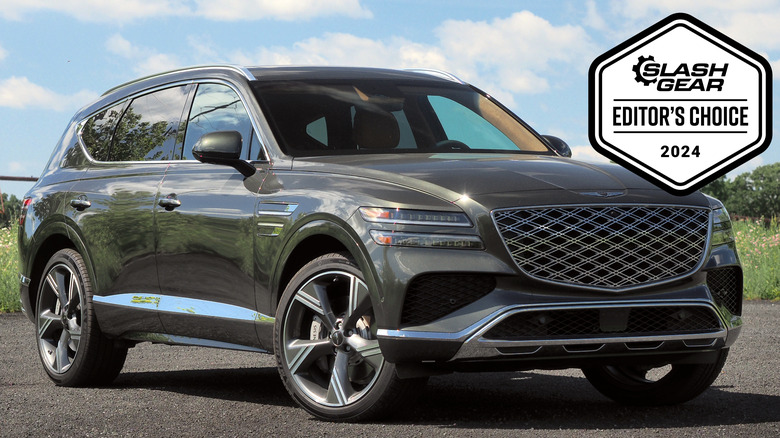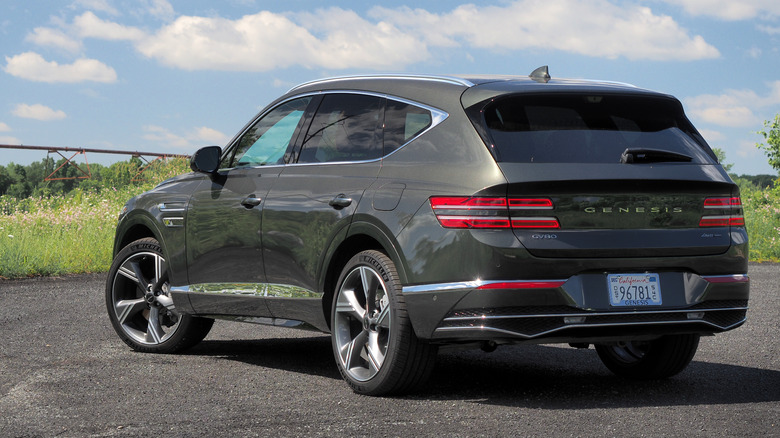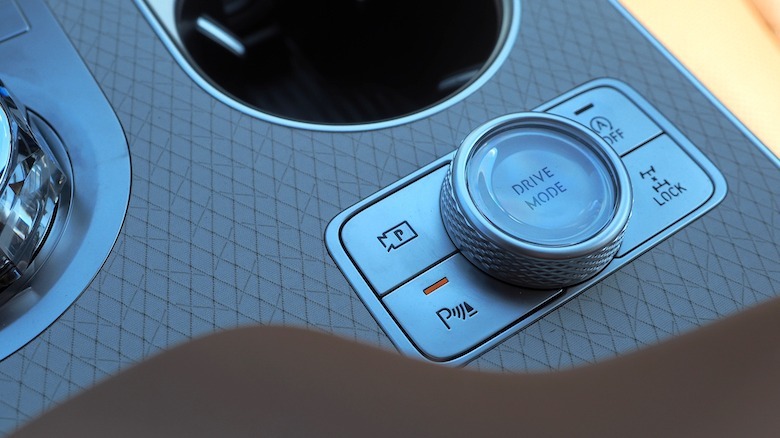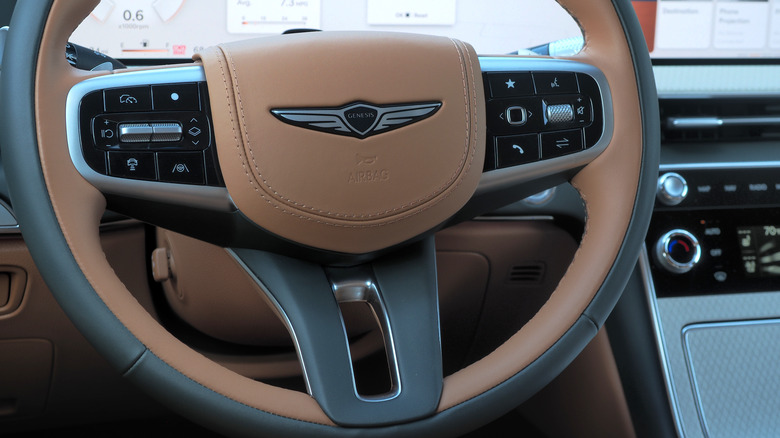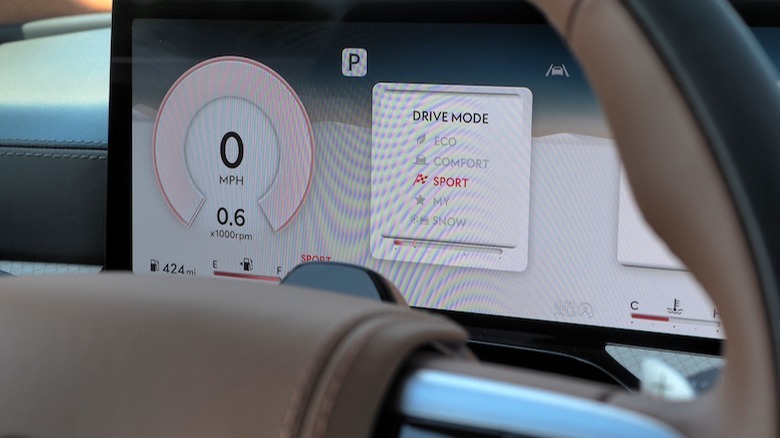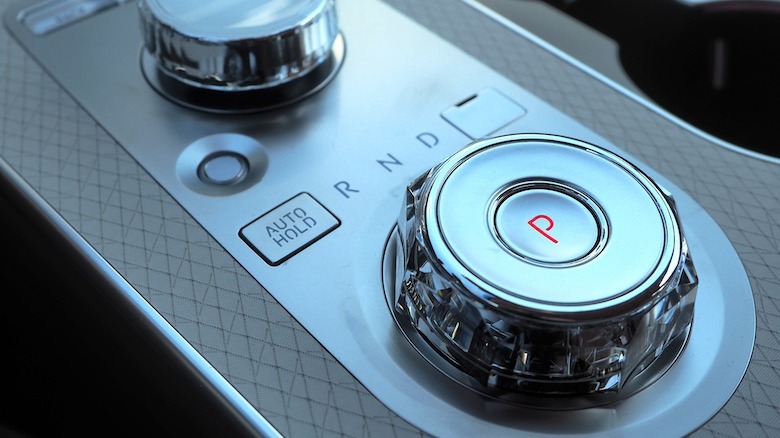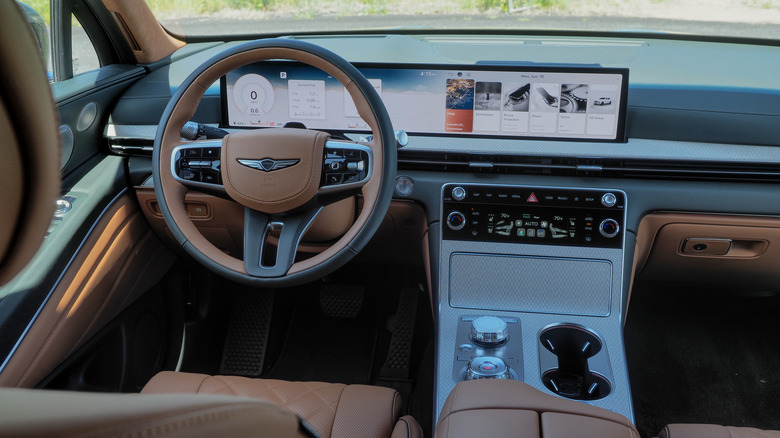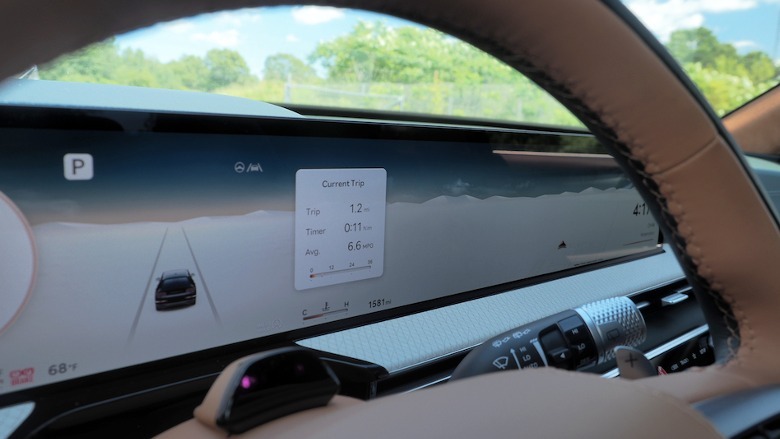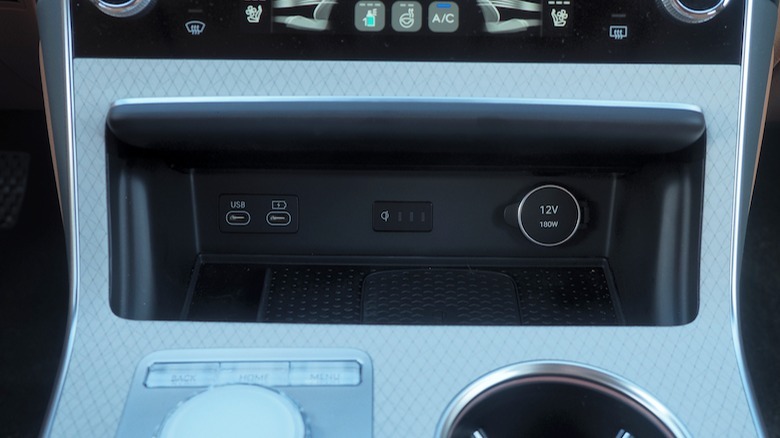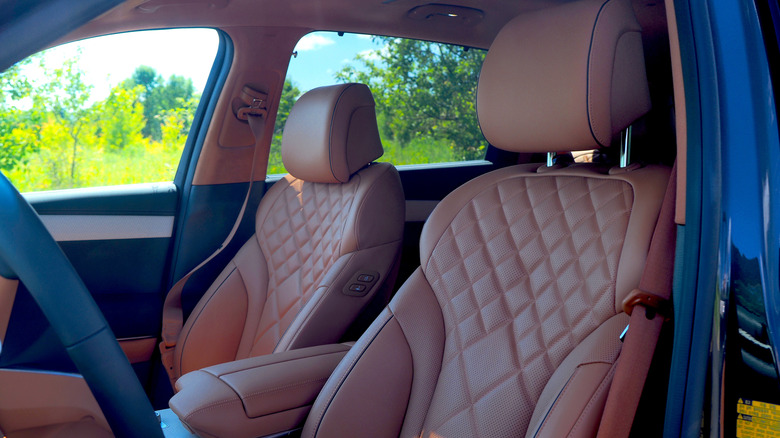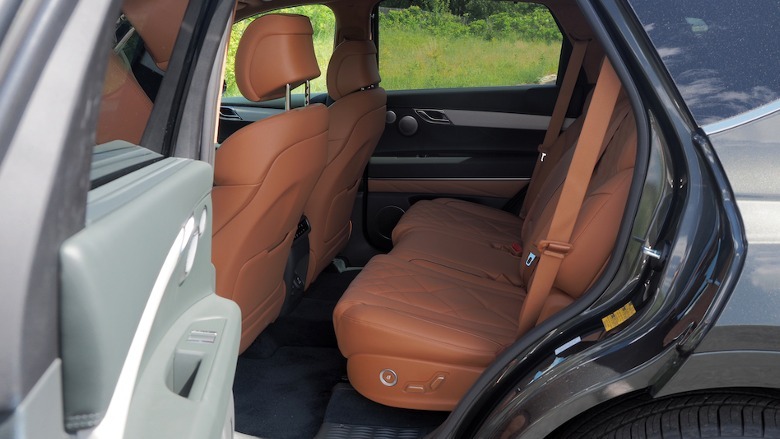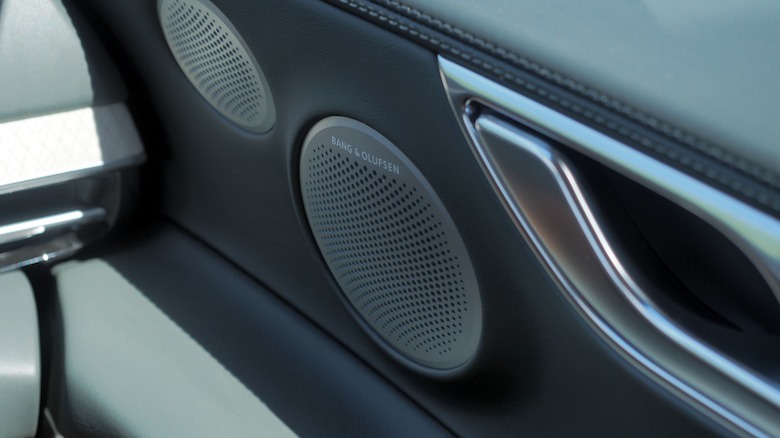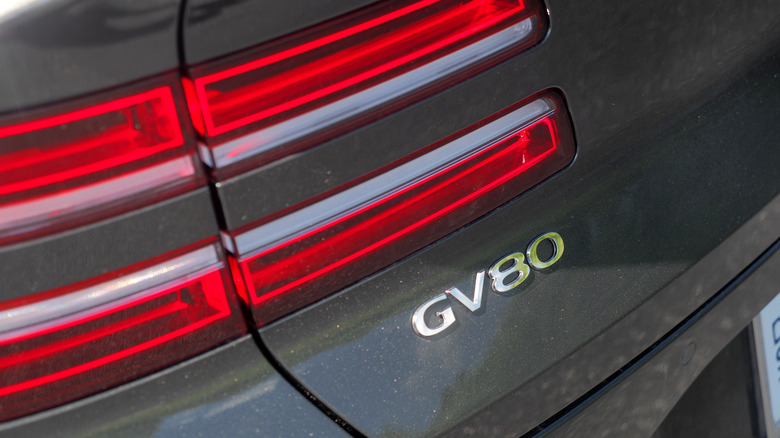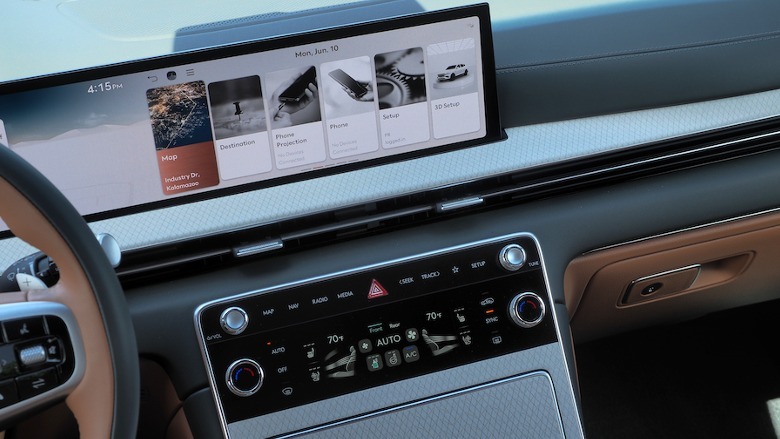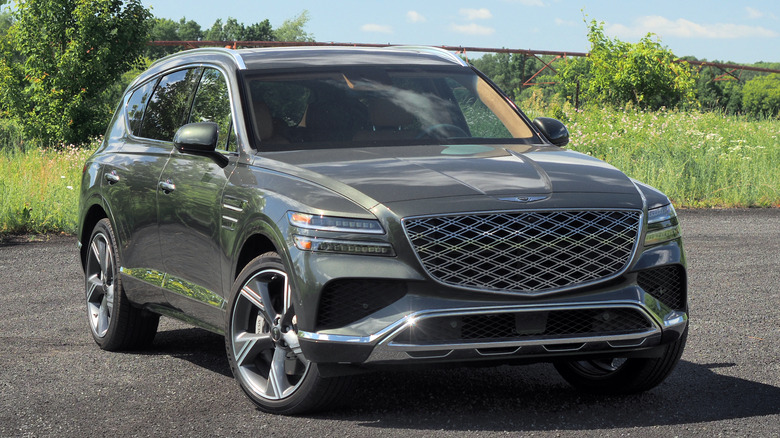2025 Genesis GV80 Review: With A Luxury SUV This Good, Who Needs Legacy?
- Handsome styling wraps a spacious cabin
- 3.5L V6 is smooth and powerful
- Well-equipped at all grades
- High-tech dashboard looks and works well
- No electrified option
- Optional third row seats are snug
The 2025 GV80 makes it easy to forget that Genesis as a standalone brand is less than a decade old. Revamped for the new model year, the updated GV80 keeps what worked — like aggressive pricing and striking looks — while refining the cabin and leveling up the technology.
The Bentley gang at Crewe could be forgiven for a little side-eye at the GV80. The original GV80 Concept was the handiwork of Luc Donckerwolke, his inaugural design after moving from the storied British automaker to the Hyundai luxe upstart. Then again, it's hardly like a six-figure Bentayga and the GV80 play in the same pool, so perhaps the only thing which matters is that Genesis buyers are getting a mighty handsome SUV.
The beefy grille manages to avoid BMW-style excesses, while Genesis' dual-strake headlamps — and their accompanying vents to the rear of the front wheel wells — look sharp and distinctive. The same can be said for the flowing shoulder line, which helps visually minimize what's actually a pretty big SUV. At the rear, sharply creased surfacing and that eye-catching light signature reappear.
Two turbo engines to choose from
Genesis is not afraid of shiny trim, but it's in wheel aesthetics that the automaker has been making its mark in recent years. Those on the GV80 aren't quite as outlandish as we've seen on other Genesis models, but they're still a welcome flourish amid. Up to 22-inch rims can be specified on the 2025 model.
Pricing kicks off at $58,700 (plus $1,350 destination) and, as before, there are two engine options. The entry GV80 2.5T gets a 2.5-liter turbocharged inline-four, with 300 horsepower and 311 lb-ft of torque. Stepping up to the GV80 3.5T (from $73,800 plus destination) swaps that for a 3.5-liter twin-turbo V6, with 375 horsepower and 391 lb-ft of torque.
All-wheel drive is standard with both engines, as is an 8-speed automatic transmission. Multi-link suspension front and rear is also standard, though the 3.5T gets electronically-controlled suspension with Genesis' Road Preview system. That uses a camera to spot potential potholes or other disturbances in the road ahead and pre-adjust the suspension stiffness to suit. It's an available option on the 2.5T.
There's no adjustable air suspension, though, to change the 8.1 inches of ground clearance (or, for that matter, drop the SUV to aid entry/exit). What you can add — though only on the GV80 3.5T — is an electronic limited-slip differential.
The V6 is smooth, refined, and unexpectedly sporty
Genesis' turbocharged inline-four is a perfectly capable engine, but it's hard to argue with the smoothness and punch of the bigger V6. Not only does it have more torque, but it also arrives earlier: 1,300 rpm, versus 1,650 rpm on the 2.5T. It adds to the GV80's sense of serene potency, even when the drive mode — of which there are five: Comfort, Smart, Eco, Sport, and Custom — is set to its most comfortable configuration.
The result is hushed and refined, and never seemingly lacking in grunt for impromptu overtaking. Switch to Sport and, though this SUV still definitely leans on the cosseting side of the equation, the stiffened suspension avoids undue body roll. It hustles nicely without ever losing composure, the 8-speed auto slushing through its ratios with nary a hiccup.
If there's a downside, it's the thirst. While Genesis makes an all-electric version of the smaller GV70 SUV, and of the G80 sedan, there's still no GV80 EV. Driven placidly, the 3.5T can hit its 16 mpg city, 22 mpg highway, and 19 mpg combined EPA figures (the 2.5T is rated for 19, 24, and 21 mpg respectively), but it's hard not to wish for at least some hybrid action to make things a little more frugal overall.
A more modern dashboard
Then again, sitting in the GV80 doesn't exactly bring frugality to mind. While the exterior styling has generally been left alone — no bad thing — the dashboard has seen a significant design and tech upgrade.
Gone is the odd, pre-refresh rugby ball-shaped steering wheel, replaced with a much more traditional version. The digital driver display (with its weird 3D effect gauges) and separate 14.5-inch touchscreen perched atop the dash are now replaced with a single, 27-inch OLED screen that handles instrumentation and infotainment. It looks sleeker and more modern, but even more useful, it's easier to reach to tap Genesis' cleaned-up and pared-back UI.
Wireless Apple CarPlay and Android Auto support are being added, and there are four USB-C ports as standard, along with SiriusXM and navigation. Genesis leaves the cup holders open, but covers the wireless phone charging nook, under the redesigned HVAC control panel. That's centered around a larger touchscreen, to adjust the three or four zone climate control, plus things like heated seats (including ventilation on the 3.5T) and the heated steering wheel, and the fragrance diffuser.
Spacious and well-equipped
Leatherette seats are standard on the entry-trim GV80 2.5T; from Advanced trim up there's leather, and the 3.5T Prestige you see here gets swankier Nappa hide. 3.5T trims also get Genesis' Ergo Motion driver's seat, adding massage, plus real wood trim rather than the 2.5T's piano black. An 18-speaker, 1,400 watt Bang & Olufsen audio system is optional on the 2.5T and standard on the 3.5T, and sounds fantastic.
It's hard to fault Genesis's fit and finish, here. From the knurling on the column stalks, to the glass-effect center console controls, to the two-tone steering wheel with its fancy stitching, the GV80 feels elevated in a way that similarly priced SUVs from the traditional luxury players often struggle to match. It's not all visual glitter either, with thoughtful features like side controls for the adjusting the front passenger seat, biometric access, and a head-up display (standard on the 3.5T) all making sure Genesis can't be accused of skipping amenities.
On that basis, the fact that a 360-degree camera isn't standard on all trims seems odd, though at least the hands-free, auto-opening power liftgate is. Blind spot warnings with collision-avoidance assist and clear cross-traffic collision-avoidance assist, lane-departure warning, lane-keeping and lane-following assist, and forward collision-avoidance assist are standard across the board.
A three row option, but only for kids
All 2025 GV80 trims get Highway Driving Assist 2, Genesis' hands-on adaptive cruise control with lane-keeping system. It's smooth and reliable, though those making frequent road trips will probably look with envy at hands-off systems like Super Cruise and BlueCruise. I'd gladly swap that in instead of Genesis' clever-but-gimmicky Remote Smart Parking Assist, which allows you to pull the SUV in or out of a parking spot from the key fob.
As before, most GV80 trims are two-row only, seating five. Genesis does offer a three-row option, nudging that up to seven seats, but only on the GV80 3.5T in the Advanced trim. That gets power-folding third row seats, though space back there is definitely constrained. Think kids, not adults.
There's 36.5 cu-ft of cargo space behind the second row (or 11.6 cu-ft behind the third row, if fitted). Drop the second row seats and that expands to 71.1 cu-ft. The GV80 is rated to tow up to 6,000 pounds, regardless of which engine is under the hood.
2025 Genesis GV80 Verdict
Plenty has been said about Genesis' rapid ascent in the luxury car segment, going from mildly entertaining Hyundai spin-off to aggressively competitive in under ten years. SUVs like the 2025 GV80 illustrate the strategy behind that stratospheric rise. While the automaker clearly knows how to cherry-pick the right features to sate high-end vehicle buyers, it doesn't forget personality along the way.
The result looks distinctive and handsome, its classic proportions managing to avoid the predictable heft that many rivals succumb to. Inside, meanwhile, even lesser trims are well-equipped, though splashing out on the GV80 3.5T Advanced for the bigger engine feels like the strategy worth pursuing.
Compromises encountered along the way are small, though not insignificant. Electrification of some measure would be welcome, for economy reasons even if the torque-rich V6 doesn't particularly lack in low-end pull, while the third row is only really scaled for occasional use. Nonetheless, what stands out about the 2025 Genesis GV80 is just how compelling it feels as a refined daily-driver: not just an attainable alternative to the usual big SUVs from Mercedes and BMW, but a luxury powerhouse in its own right.
